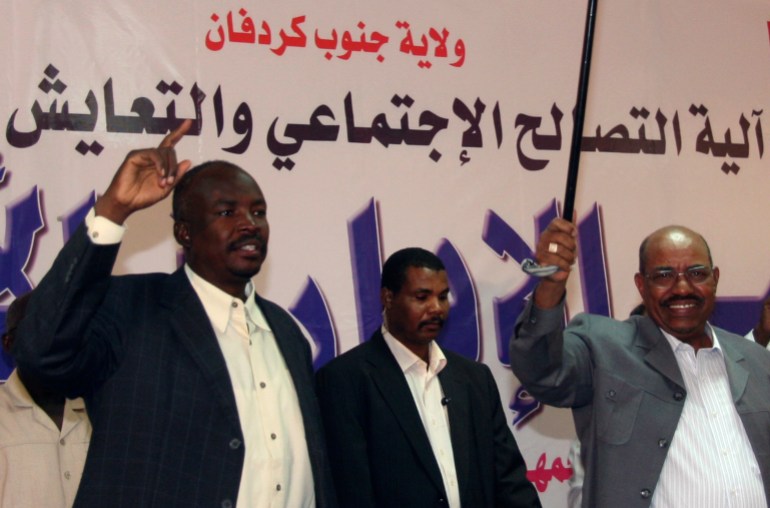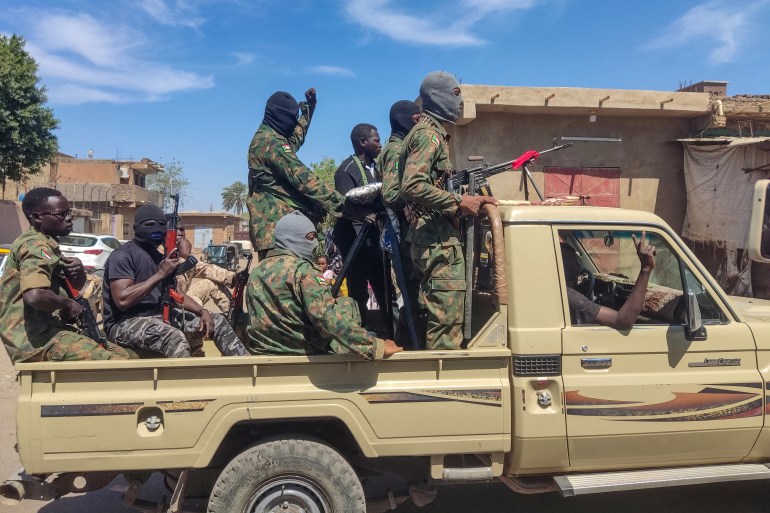In a new twist in Sudan’s civil war, a famous tribal chief has emerged from obscurity to support the army.
Called Musa Hilal, he is the original leader of the nomadic tribal (also called “Arab”) militias known as the Janjaweed, responsible for atrocities during the Darfur War, which began in 2003.
In that war, Hilal fought alongside Mohamed Hamdan “Hemedti” Dagalo as part of the Sudanese government’s war against sedentary agricultural tribes (referred to as “non-Arab” tribes) who rebelled against the state. More than 300,000 people have been killed due to armed conflict, as well as disease and famine caused by war, according to the United Nations.
More than two decades later, Hemedti finds himself involved in another conflict, leading the Paramilitary Rapid Support Forces (RSF) – which emerged from the Janjaweed – in an existential struggle against the Sudanese Armed Forces (SAF).
Last week, Hilal broke his silence on the year-old conflict, telling your supporters that he “stands alongside the army,” and adding that local tribes have asked him to “prioritize the stability and peace of the state.”
He also reportedly criticized the RSF for the actions the force is accused of committing, such as rape and looting.
Hilal and Hemedti are both from the nomadic Rizeigat tribe, but Hilal is also a respected tribal leader within the Mahamid branch of the subtribe, giving him some local status over Hemedti.
Most nomadic tribes in Darfur have thrown their support behind the RSF, lending recruits, local knowledge and access to vital supply lines.
But given Hilal’s status, his announcement could undermine Hemedti’s support base and risk triggering infighting among nomadic tribes, according to experts and sources close to his clan.
Some believe that Hilal’s move could be an attempt to regain political relevance in Darfur.
“Hilal doesn’t have many supporters [compared to Hemedti] right now, but he can raise a lot,” said Samya Hendosa, a member of the Mahamid clan with close relatives of Hilal and Hemedti, and herself related to Hemedti, despite her fierce criticism of the RSF.
“What is clear is that the army and Hilal reached an agreement where Hilal [and his supporters] will receive a certain amount of money, materials and weapons,” he added.
Friend or enemy?
In 2003, the army outsourced a counterinsurgency to Hilal and his followers.
They were paid and armed to fight “non-Arab” armed groups revolting against the government’s marginalization of their tribes and the region.
Hilal’s forces committed summary executions, burned entire villages, and used rape as a weapon of war, according to Human Rights Watch. Their tribal militias became known colloquially as “Janjaweed,” which means “demons on horseback” in Sudanese Arabic.
As a reward for crushing the insurgency, Sudan’s autocratic former president Omar al-Bashir appointed Hilal as his special advisor in 2008. But Hilal became disillusioned with al-Bashir and believed he was not interested in rewarding him for crushing an rebellion or develop Darfur. , so he left Khartoum in a rage and returned to Darfur five years later.
In 2014, Hilal formed his own armed movement, the Revolutionary Awakening Council, which al-Bashir saw as a threat to his rule. The former president responded by appointing Hemedti as leader of the RSF, which was later tasked with disarming and arresting Hilal and his sons in 2017.
“Hilal’s project was to unify the tribes of Darfur against Khartoum, and al-Bashir felt that this could turn into something big against him. That’s why he immediately tried to divide [the Arab tribes] sending RSF after him,” said Suliman Baldo, founder of Sudan Transparency and Policy Tracker, a think tank that covers political issues in the country.

Months after the army and RSF overturned Sudan’s fragile democratic transition in October 2021, they released Hilal. He kept a low profile even after SAF leader Abdel Fattah al-Burhan and Hemedti turned on each other to spark civil war in Sudan in April last year.
But in February this year, having kept a low profile since the start of the war, Hilal allegedly promised Hemedti that he would remain neutral in exchange for the equivalent of US$750,000, said Baldo, as well as local journalists and sources within Rizeigat. tribe and RSF who did not want to be identified.
“At the tribal level, there was a reconciliation of sorts. But now we have this video,” Baldo told Al Jazeera, referring to footage showing Hilal pledging his support for the army.
Divide and conquer
In the weeks leading up to Sudan’s civil war, activists said military intelligence tried to recruit Rizeigat fighters into a new militia to undermine Hemedti’s tribal base, which he depends on for fighters and logistical support.
Hendosa believes that military intelligence is doubling down on its divide and conquer tactics by co-opting Hilal. She said Hilal has previous links to prominent members of Sudan’s Islamic political movement, who are collectively known as Kizan.
The Kizan ruled under al-Bashir for three decades and are speculated to have several senior officers in the security forces, including military intelligence.
“The plan of the Islamic movement in Sudan is to divide the Arab tribes. That’s the goal,” Hendosa told Al Jazeera.
“It is in the interests of military intelligence to divide the Arabs of Darfur and find ways to make them fight each other. This is consistent [historically] with the military intelligence strategy”, added Baldo.

Hilal’s announcement has already generated divisions and reactions among leaders of the Rizeigat tribe. In a video uploaded and later deleted from Facebook, a Mahamid chief said that Hilal did not represent his clan’s position and that the Mahamid in West Darfur strongly supported the RSF.
“RSF is interested in bringing freedom, justice and fairness [to us all],” said tribal leader Mahamid. “The army is also a criminal, a butcher and a murderer… and in the past]used all its violence against us.”
Security guarantees
Earlier this month, several non-Arab armed movements declared war on the RSF after renouncing their neutrality in North Darfur.
The RSF and aligned militias responded by burning at least 15 mostly non-Arab villages west of el-Fasher, according to the Darfur Network for Human Rights. The army also indiscriminately shelled ostensible RSF positions, killing dozens of civilians.
The growing violence has raised fears that an all-out tribal conflict could break out in North Darfur. The tense situation may have forced Hilal to support the army to protect his tribal supporters from ethnically motivated attacks, according to Ahmad Gouja, a local journalist in Darfur.
“I think he is trying to protect his Mahamid tribe from possible tribal clashes… now that he is on the same side as the non-Arab armed movements, this will restore some calm and balance,” Gouja told Al Jazeera.
Mohamed Fateh el-Yousif, the founder of local channel Darfur 24 agrees, but believes Hilal is also trying to stop the army’s indiscriminate bombing of his community.
“He took this position to ally himself with the army, so that warplane bombs would stop hitting his area,” he told Al Jazeera.
Baldo also believes that Hilal’s decision was predictable, arguing that he would never have accepted taking a backseat to Hemedti.
“Hilal is seen as someone older and more legitimate as a tribal chief and Hemedti does not claim to be a tribal chief at any level,” he told Al Jazeera. “In that category, Hilal is head and shoulders above Hemedti, so he would never join the RSF.”
This story originally appeared on Aljazeera.com read the full story







































